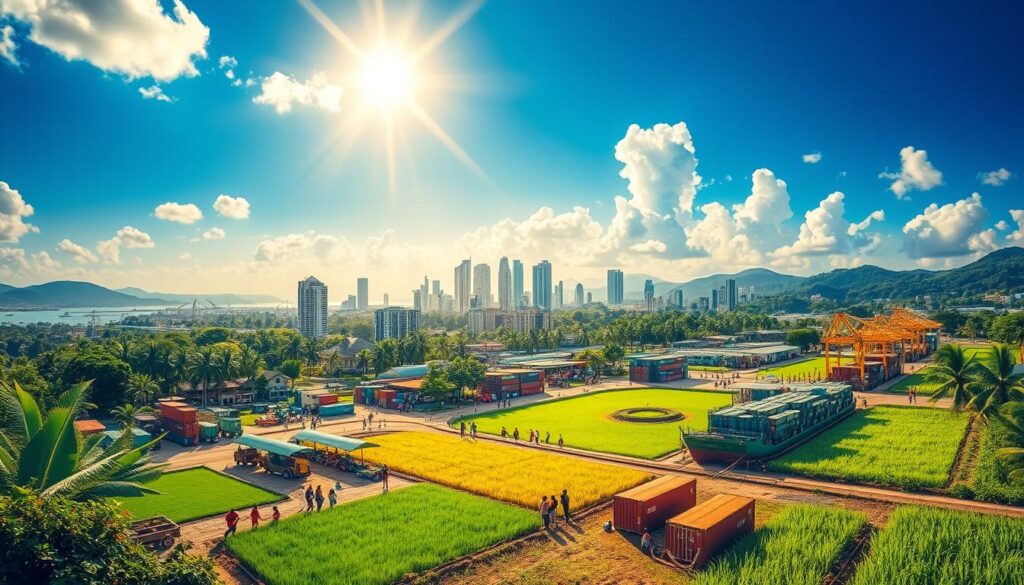Sri Lanka’s Digital Economy Strategy Aims for $3 Billion by 2024
As Sri Lanka moves forward from economic troubles, its economy sees a chance for growth through digital change. The information and communications technology (ICT) sector is becoming strong. It could be worth USD 3.47 billion, which is 4.37% of the GDP. The country has big plans to grow its tech sector.

The country is really putting its money into ICT. By 2024, they plan to spend Rs. 3 billion to help the digital economy reach $15 billion by 2030. They’ll do things like set up a National Single Window and update laws for today’s digital world. E-governance moves will bring Sri Lanka into a digitally powered future.
Digital skills in running a country could make services better and more efficient. By March 2024, all government payments will be made electronically. Also, keeping digital data safe is a priority. They want to make sure everyone’s information is secure against cyber threats.
There’s a lot of hope for Sri Lanka as it aims to be a tech hub in the region. With a goal to have a $3 billion digital economy by 2024, Sri Lanka is pushing to be a leader in the digital world. This could mean more jobs and new businesses in ICT and BPM sectors.
The Vision of a Digitally Empowered Sri Lanka
Sri Lanka aims high to be South Asia’s digital leader. The nation plans to merge digital infrastructure, policy changes, and talent growth. Increasing the startup landscape and digital skills across sectors shows their deep commitment.
Overview of Digital Sri Lanka 2030 Goals
Digital Sri Lanka 2030’s plan is to become a digital economy leader by 2030. Key goals include boosting the digital economy to USD 15 billion, says FITIS. Projects like DigiGo will help small businesses compete worldwide by going digital.
Achieving Inclusive & Sustainable Growth Through Tech
Sri Lanka aims for growth that helps everyone, using tech. They’re educating a thousand government employees in cybersecurity. This is with help from ISC2 Sri Lanka Chapter and Sri Lanka CERT. This will make digital services more trusted and inclusive.
Core Principles Driving the Digital Transformation
The National Digital Economy Strategy for 2030 relies on six main values. These include inclusivity, sustainability, and openness. It aims to close the digital gap with policy changes and investment. This encourages innovation in startups and connects Sri Lanka to global ideas.
Sri Lanka’s Digital Landscape: A Springboard for Innovation
Sri Lanka is on a path to modernization, with a focus on digital growth. The government and Sri Lanka’s Information and Communication Technology Agency (ICTA) are key players. Together, they aim for a future where technology drives economic success.
Partnerships formed during events like the National Digital Consortia show this effort in action. For example, on January 11th, ICTA joined forces with big names in the industry. This collaboration helps bring in global tech knowledge and innovative ideas.
Current State of Connectivity and Access
Mobile subscriptions in Sri Lanka are skyrocketing. This trend opens up the internet to millions, showing major progress in digital access. It also lays the groundwork for a thriving e-commerce scene. Businesses and customers alike benefit from safe online deals.
With these advances, Sri Lanka’s digital economy could hit $3 billion by 2024. This goal is part of the 2024 Budget, highlighting the digital economy’s importance to government plans.
Developing the Digital Government and E-Governance
Moving towards a digital future, Sri Lanka emphasizes e-governance. This push aims at smarter governance, helped by 5G and better digital infrastructure. It makes government services quicker and more efficient online.
The effort to upgrade digital government tools focuses also on growing the economy. It looks to make Sri Lanka a welcoming place for digital startups through laws, policies, and investments.
Investment in Digital Infrastructure and Talent Development
Sri Lanka is investing in its digital landscape. It’s looking at advanced tech like Artificial Intelligence, biotechnology, and the Internet of Things. These investments will boost digital services and markets.
Education is also key, with plans for a National Centre for Artificial Intelligence. This is to enhance skills in the hospitality industry and promote digital learning.
Strengthening Cybersecurity and Data Privacy
As digital services grow, so does the focus on cybersecurity and privacy. Strong cybersecurity is crucial for safe digital spaces. Sri Lanka wants to build trust in its digital services, aiming to attract 5 million tourists.
This includes a goal of 2.5 million high-end visitors, as part of its ‘Visit Sri Lanka’ tourism plan. Economic growth, expected at 4.4% in 2024, will also benefit from digital advances and tourism. This blend of traditional charm and digital innovation offers a bright future.




